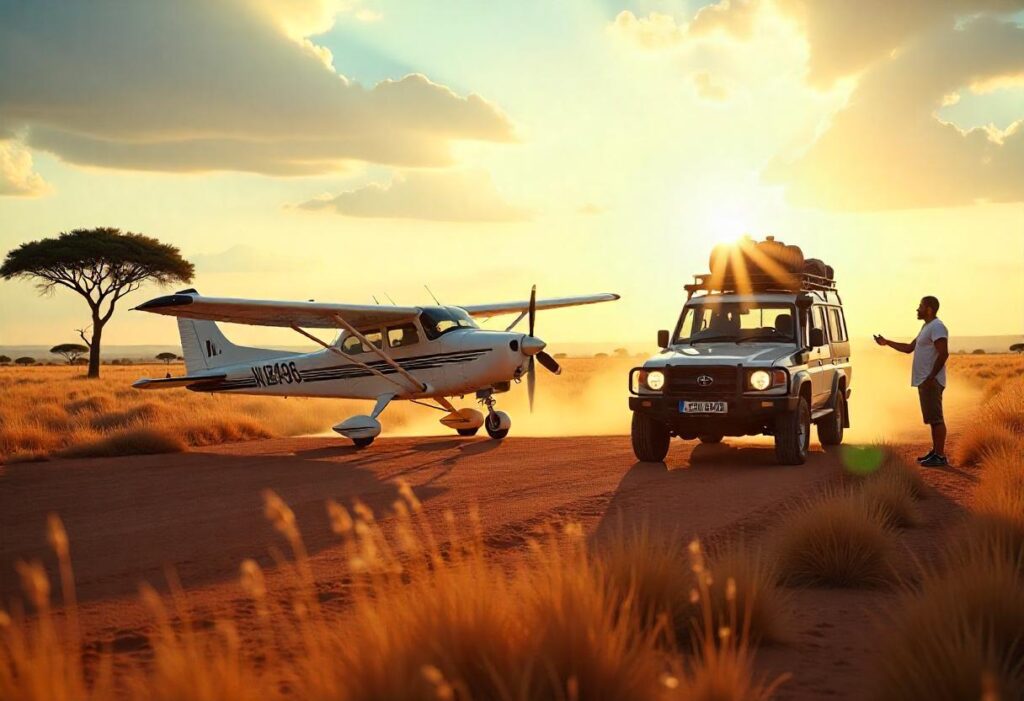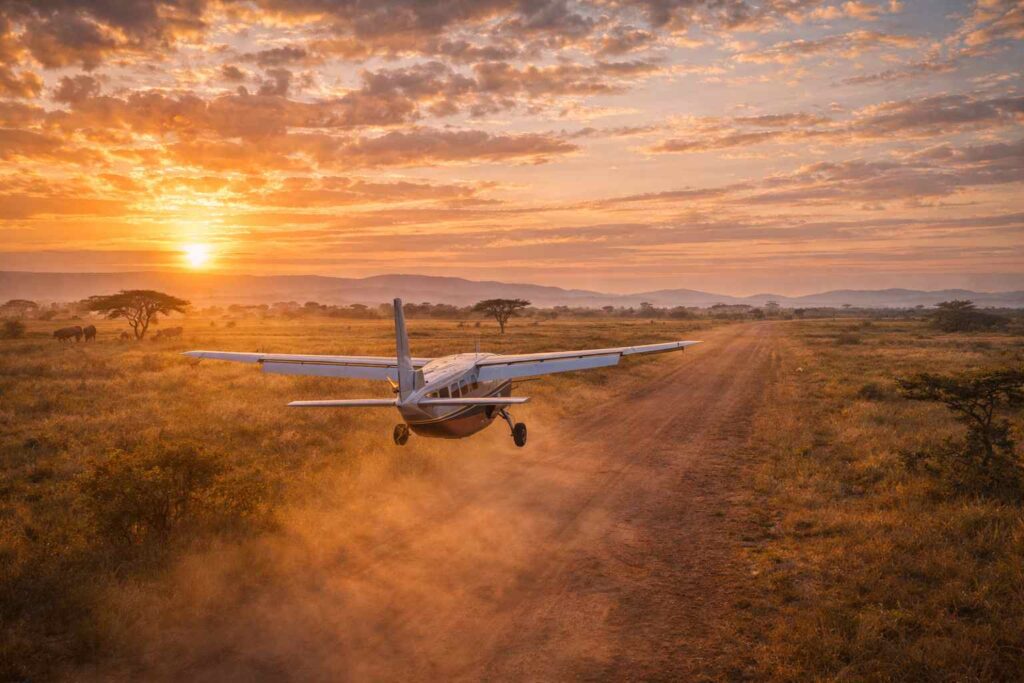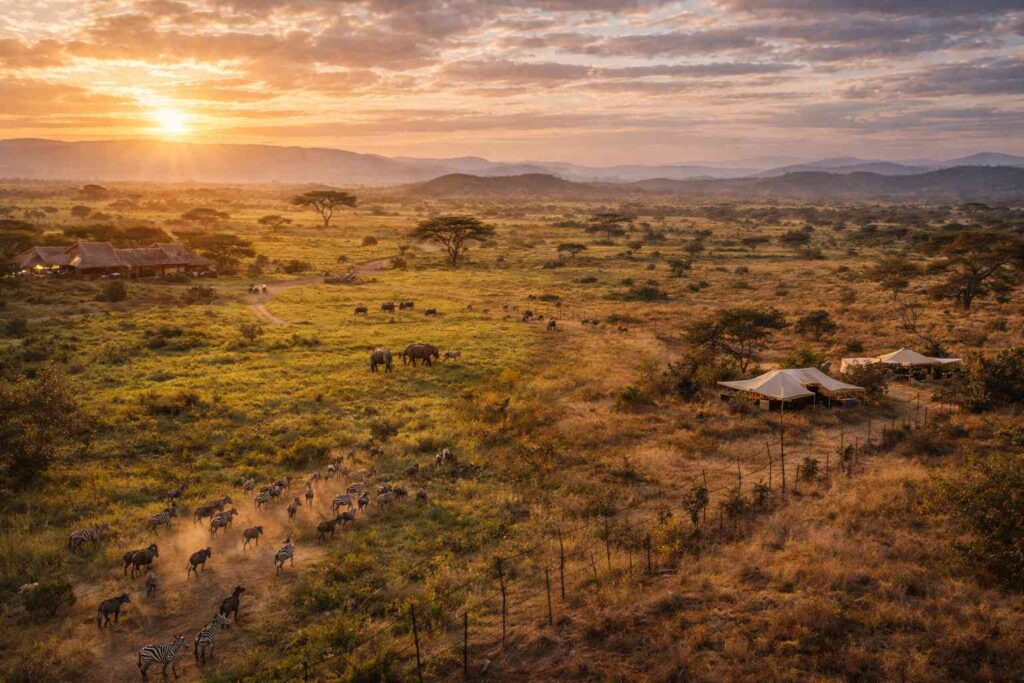When planning an African safari, how you get from one place to another plays a big role in your overall experience. Whether you’re flying between remote camps or taking scenic drives through national parks, understanding the logistics of safari travel helps ensure a smooth and enjoyable trip. Here’s a breakdown of your options—from bush flights to road transfers—and what to expect when getting around on safari.
Fly-in safaris: Fast, scenic, and efficient
What is a fly-in safari?
A fly-in safari involves traveling between safari destinations via small aircraft, usually light charter planes that land directly at bush airstrips near lodges and camps. This is often the fastest and most comfortable way to cover long distances in Africa.
Pros of flying
- Saves time: Especially important in large countries like Tanzania, Namibia, or Botswana
- Scenic aerial views: Get a bird’s-eye view of dramatic landscapes and wildlife below
- Direct access to remote camps: Many lodges are only accessible by air
Things to know
- Luggage limits: Most bush planes allow soft bags only, typically 15–20 kg per person
- Scheduled vs. chartered: Some routes run on a fixed schedule, others require private charters
- Weather can affect schedules: Be flexible, especially during rainy seasons
Road transfers: Affordable and immersive
When to choose road travel
In places like South Africa or Kenya, driving between parks is common and often scenic. Road transfers work best when distances are manageable and roads are in good condition.
Pros of driving
- Cost-effective: Especially for families or small groups
- Great for first-time visitors: Stops at local markets, villages, or viewpoints add cultural depth
- Luggage flexibility: Less strict packing restrictions compared to flights
Things to consider
- Travel times vary: Some park transfers take 6–8 hours or more
- Conditions differ by region: Roads can be rough, dusty, or muddy, especially during wet seasons
- Private vs. shared: Private transfers are faster but more expensive; shared shuttles are budget-friendly
Common safari travel combinations
Fly in, drive out (or vice versa)
This is a popular option for those who want a balance between comfort and cost. Fly to your most remote destination, then drive back while exploring other areas en route.
Drive-and-stay safaris
Ideal in areas with well-connected parks like the Garden Route in South Africa or the northern safari circuit in Tanzania. These trips often use 4×4 vehicles with guides and allow for more flexibility.
Cross-border logistics
If your itinerary spans multiple countries (e.g., Botswana + Zambia + Zimbabwe), keep in mind:
- Border posts can take time
- Flights are often easier than overland transfers
- Visas and travel insurance may be required for each country
How long does it take to travel between parks?
Travel times vary by country, terrain, and mode of transport. Here are a few examples:
| Route | Mode | Approximate travel time |
|---|---|---|
| Arusha to Serengeti (Tanzania) | Fly | 1–2 hours |
| Nairobi to Masai Mara (Kenya) | Drive | 5–6 hours |
| Windhoek to Sossusvlei (Namibia) | Drive | 5–7 hours |
| Kasane to Okavango Delta (Botswana) | Fly | 1 hour |
| Cape Town to Kruger (South Africa) | Fly | 2.5 hours |
FAQs about getting around on safari
Yes. While the planes are small, they’re operated by licensed pilots and regulated companies with good safety records.
Yes. Bush flights have limited seats and often fill up quickly—especially in high season.
In some parks, like Etosha (Namibia) or Kruger (South Africa), yes. But in others, especially in Botswana or Zambia, guided transport is recommended.
Safari logistics are usually well-coordinated by your tour operator or lodge. If weather delays a flight, your next lodge will be informed.
Final thoughts
Choosing the right mode of transport for your safari can enhance your experience and help you make the most of your time. Whether you soar over the savannah in a light aircraft or journey through rural Africa by road, each option offers its own adventure. Work with a trusted operator to tailor your transfers based on your itinerary, budget, and comfort level.






